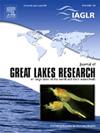Connecting tributary mercury loads to nearshore and offshore sediments in Lake Superior
IF 2.5
3区 环境科学与生态学
Q3 ENVIRONMENTAL SCIENCES
引用次数: 0
Abstract
Lake Superior has a vast and largely undeveloped watershed in comparison to the other Great Lakes, which makes it challenging to study mercury (Hg) sources and cycling. To examine Hg inputs to Lake Superior, we conducted an expansive binational assessment in 40 watersheds from a diverse range of landcover types. We further paired tributary Hg data to sediment source portfolios in the nearshore and offshore zones of Lake Superior through partnership with the Great Lakes Sediment Surveillance Program. We observed that total Hg loads were highest in the spring driven by the combination of elevated Hg concentrations and increased water discharge from snowmelt. In addition, total Hg concentrations in tributaries from remote, heavily forested regions, such as Pukaskwa National Park and the Minnesota Northshore, were higher than the Southshore and Thunder Bay regions. Methylmercury concentrations and loads were more spatially dependent, often corresponding to regions with more wetlands (e.g., Michigan Upper Peninsula). We estimated that the total Hg tributary load to Lake Superior in 2021 was 126 kg per year. To further examine the fate of watershed Hg sources, we examined sediments from 28 sites in Lake Superior using Hg stable isotopes. At open water sites, precipitation was the primary Hg source to sediments, but within nearshore sites Hg originated predominantly from watershed runoff. This work further defines the sources and fate of Hg within Lake Superior and highlights how Hg delivery is intrinsically tied to varying hydrologic regimes.
将支流汞负荷与苏必利尔湖近岸和离岸沉积物联系起来
与其他五大湖相比,苏必利尔湖有一个很大的未开发的流域,这使得研究汞(Hg)的来源和循环具有挑战性。为了研究向苏必利尔湖输入的汞,我们在40个不同土地覆盖类型的流域进行了广泛的两国评估。通过与五大湖沉积物监测项目的合作,我们进一步将支流汞数据与苏必利尔湖近岸和近海地区的沉积物来源组合进行配对。我们观察到,在汞浓度升高和融雪水量增加的共同作用下,春季总汞负荷最高。此外,来自偏远、森林茂密地区(如Pukaskwa国家公园和明尼苏达州北岸)的支流中汞的总浓度高于南岸和桑德贝地区。甲基汞浓度和负荷的空间依赖性更强,往往与湿地较多的地区相对应(如密歇根上半岛)。我们估计2021年苏必利尔湖的总汞支流负荷为每年126千克。为了进一步研究流域汞源的命运,我们使用汞稳定同位素检测了苏必利尔湖28个地点的沉积物。在开阔水域,降水是沉积物的主要汞来源,但在近岸地区,汞主要来自流域径流。这项工作进一步定义了苏必利尔湖内汞的来源和命运,并强调了汞的输送是如何与不同的水文制度内在联系在一起的。
本文章由计算机程序翻译,如有差异,请以英文原文为准。
求助全文
约1分钟内获得全文
求助全文
来源期刊

Journal of Great Lakes Research
生物-海洋与淡水生物学
CiteScore
5.10
自引率
13.60%
发文量
178
审稿时长
6 months
期刊介绍:
Published six times per year, the Journal of Great Lakes Research is multidisciplinary in its coverage, publishing manuscripts on a wide range of theoretical and applied topics in the natural science fields of biology, chemistry, physics, geology, as well as social sciences of the large lakes of the world and their watersheds. Large lakes generally are considered as those lakes which have a mean surface area of >500 km2 (see Herdendorf, C.E. 1982. Large lakes of the world. J. Great Lakes Res. 8:379-412, for examples), although smaller lakes may be considered, especially if they are very deep. We also welcome contributions on saline lakes and research on estuarine waters where the results have application to large lakes.
 求助内容:
求助内容: 应助结果提醒方式:
应助结果提醒方式:


